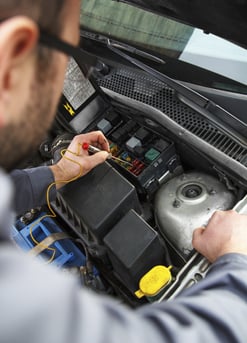There’s a need — almost a demand — in today’s global economy for blue- and white-collar workers to remain competitive by reinventing themselves one or more times during the course of their careers. For example, marketing communications practitioners must be skilled in writing, computer and mobile apps, web design, social media, e-commerce and graphic design to keep up with the winds of change. College programs cover the basics, but individuals are obligated to continue their education long after the graduation ceremony.
 Employees and employers in other industries, and even the mega industries themselves, are similarly challenged. Auto mechanics must study the sophisticated on-board technologies loaded into late-model vehicles; flooring companies need to stay on top of a growing selection of tile, carpet, laminate and wood products; and the tech industry is driven 24/7 to remain relevant.
Employees and employers in other industries, and even the mega industries themselves, are similarly challenged. Auto mechanics must study the sophisticated on-board technologies loaded into late-model vehicles; flooring companies need to stay on top of a growing selection of tile, carpet, laminate and wood products; and the tech industry is driven 24/7 to remain relevant.
Enter the auto-after market where brick-and-mortar dealers face stiff competition around every bend. If you are a local auto aftermarket dealer still in business, then there’s a good chance you’ve already made it past one or two rounds of cuts. The future looks equally challenging, so dealers must learn how to remain competitive or get left behind. Toss in a cliché such as “when the going gets tough, the tough get going,” and one gets the picture of where the market is heading.
Auto-after Darwinism was discussed in our recent article, “How to Increase Click-n-Mortar Sales at Your Auto Parts Store,” so this writing may be considered a second installment. We start the discussion where the other article ended — with the concepts of “owning a passion for the industry” and “offering viable solutions to customers.”
Product Research
The first task is finding a product or product line that interests you and simultaneously fulfills several supply-and-demand conditions. The research could take days or weeks, but don’t lose sight of the fact that it could parlay into a substantial return on investment. Begin by bookmarking web pages and documenting products, competitors and your insights — a spreadsheet is a great tool in this capacity. Filter and thoroughly analyze the results by asking variations of the Five W’s and how.
 Who will buy the product/Is there demand for it? Is selling the product sustainable in the local and/or global markets? Will the entire product line become obsolete in a few years? Is the market saturated with competitors selling the same product type? Can you buy it at wholesale prices that will enable you to be competitive? Do you want to sell online? Is your web site set up for ecommerce? Do you have the manpower and space to accommodate shipping? Is the timing right for you or the market?
Who will buy the product/Is there demand for it? Is selling the product sustainable in the local and/or global markets? Will the entire product line become obsolete in a few years? Is the market saturated with competitors selling the same product type? Can you buy it at wholesale prices that will enable you to be competitive? Do you want to sell online? Is your web site set up for ecommerce? Do you have the manpower and space to accommodate shipping? Is the timing right for you or the market?
A Google search for “trending auto after products” provides an example. There were several hits, of course, but one about “trending auto electronics parts” aroused curiosity. The Global Sources site states that its “ranking is system-generated and based on numerous buyer behavior factors.” Never assume anything is true. Confirm that claim; cross-check the results on other sites; look for government studies or academic research yielding the same information.
Three related products stood out among the ranking of “Top Products Most Buyer Inquired On” from December 2015: car DVRs (4th), parking sensors (9th) and car rearview mirrors (10th). Are these the products for your store to specialize in? They could be, but they are merely listed here to demonstrate how to start a product research.
It is worth mentioning that a new line of auto electronic parts will compete with consumer electronics stores such as Radioshack and online retailers (Overstock and Amazon) in addition to other auto-after stores. Thus, unique clusters of competitors and challenges should be anticipated as a function of your chosen segment in the auto-after market: performance, seating, wheels, exterior accessories and so on.
It would also be wise to inquire about the legalities of selling the new product(s): permits, authorizations, licensing and zoning on the state and local levels.
If the above study and analysis indicates potential success, then shift your attention to the launch pad.
Establishing the New Product Line
The data obtained via the above search in conjunction with the SWOT analysis mentioned in our earlier article should form the foundation of establishing prices, selection, inventory and logistics.
Your next task involves acquiring product knowledge. Before you place the first order of new product, you should become an expert in that particular segment. The learning curve is not easy, but it is doable.
Start with the products you want to stock. More than likely, you will have downloaded owners manuals and spec sheets from the manufacturers’ web sites during your research. If not, then it needs to be done now. Study the documentation until it becomes second nature. For example, it would be advantageous to know why the “T-1000” is superior to the "800 Series." Do this drill for every item in your new product line, and then repeat it for the competing product lines. Ultimately, you want to know how your new product line stands up to the competition — forward and back.
Do your products have more features and better warrantees? What are consumers saying about each of the products? Is the competition less expensive or more compact? Which products are the most popular? Which products are easier to install? …and so on.
Other Sales and Marketing Decisions
Deciding whether or not to offer installations is an important decision, but worth the effort. In this context, the competition will include consumer electronic stores selling auto installations (e.g. Best Buy). Depending on the local competition, offering installations at convenient times such as evenings and weekends could be lucrative because Amazon and Overstock do not play there. Furthermore, the voracious consumer appetite for car gadgets is outnumbering the available accessory and USB ports of most cars, thus necessitating the need for hard-wiring power supplies into electrical systems. Promote your store as one specializing in clean-and-fast custom installations at reasonable prices to stay ahead of the competition.
Armed with the product knowledge acquired during research and product line establishment, your store should be positioned to train customers on how to use their new equipment. Good deals on auto-after equipment are ubiquitous, but finding a dealer willing to demonstrate a new purchase is priceless. Volunteer your guidance at the point of purchase.
Finally, stocking a full line of device accessories represents another potential revenue stream. Many local retailers turn away sales by overpricing their accessories. Don’t be that guy! Make it easy for locals to buy from your store by setting prices slightly above the cost of online items including shipping (sales tax should be a wash). In fact, most people favor local shopping as long the price difference is not extreme.
A missing component in the above scenario is the final element of the Four P’s of Marketing — promotion. It is imperative to have a strategy for bringing your new products to the attention of the marketplace; otherwise you are wasting your time. Product promotion transcends the scope of this article, but in short, it should involve social media, advertising, public relations, cooperative marketing and more within the confines of your budget.
Competing with big-box stores and online retail giants is difficult, but not impossible if auto aftermarket dealers find the proper marketing niché and offer viable solutions to customers. Rejuvenate your enterprise and increase sales with a new game plan, and execute it without reservation; the payoff can be rewarding to both you and your wallet.
CrossCheck offers a suite of payment-processing solutions to assist auto aftermarket dealers. For example, Multiple Check enables customers to write 2 – 4 checks to be deposited over a period of up to 30 days. There is no credit check; the customer leaves that day with their purchase; and the revenue is guaranteed by CrossCheck.



